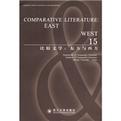比较文学
2012-1
四川大学出版社
曹顺庆
190
《比较文学:东方与西方(15)(英文版)》为中外文化比较文集,本辑主要收录学术论文26篇,主要内容为三个类型,其一,中外比较文学研究,其二,国外文艺理论研究,其三,中美小说对比研究。
INVITED ARTICLESKubin, WolfgangWhat is Good Chinese? Towards the Problem of Literature in the Chinese CommonwealthCohen, Tom" Climate Change" and the Rupture of Cultural CritiqueChristie, StuartReading the "Gap" in the Chinese Gorge: Modernist Untranslatability in John Hersey's A Single PebbleCOMPARATIVE STUDIESWong, Timothy C.The Original Evolutionary Nature of Chinese Vernacular FictionZhang, ZiqingA Dialogue between Chinese and American Poets in the New Century: Their Poetry Reading, Translation and Writing in CollaborationBender, MarkOgimawkwe Mitiwaki and "Axlu yyr kut": Native Tongues in Literatures of Cultural TransitionCULTURAL CRITIQUE & THEORETICAL DISCOURSEYe, YingGender Issues Reflected in Personal and Family Photographs in African American ObituariesDuan, LianTextual Body in City Space: A Psychoanalytic Study of the Representation ofFemale Body in Contemporary Photography and Its Social MeaningXu, ZhixiaoGender and Literature: East and West-A Female Scholar's Particular PerspectiveTang, LiSignifying Chain, Split Subject & Non-transcendental Truth: Similarities between the Thoughts of Derrida & LacanINTRODUCTION OF CONFUCIUS INSTITUTESConfucius Institute at the Arizona State UniversityConfucius Institute at the University of UtahNOTICE TO CONTRIBUTORS
In Steven Spielberg's 2002 adaptation of Philip K. Dick's Minority Report, the narrative concerns the pre-emption of "future" crimes by a form of memory and time back-loop. The film's three sensors are able to foresee crimes and arrest culprits in advance. The pre-emption thereby forecloses the deed (by arresting the would-be criminal). However, on occasion, there is a dissenting opinion among the three that produces a minority report on the "future". I will use this phrase, "minority report"-and the ccompanying image of a memory back-loop that can be controlled, or not-to examine the following hypothesis: that the alternative materialities of today have to do with certain ruptures in our time frame coming from a type of "outside". [11] That is, there are the other materialities that would include: glacial melt-off, the inundation of coasts and cities, mass extinctions, the generation of an underclass of "disposable humans" (today used for body parts), and immment oil or water wars. I will return in a moment to how these "ex factors" have invaded the American media, but will link this shift to another mutation discernible in "cultural studies" and the legacies of conceptual projects. What I will do below-in opening the question of "climate change" and the humanities, and of the legacies of twenthieth-century theory before this shift-is a preliminary scan of the question of a broader re-inscription or hypothesis of 21st century or non-anthropocene horizons. With this in mind the question posed is of how, and whether, the ex-anthropic factors that interrupt various histories and calculations of irreversible ecocatastrophism (neither fetished nor apocalyptic) operate in the mode of what (after Benjamin) we might think of as translation. Climate change is not, and perhaps could not have been a horizon engaged by Lacan or Derrida, and was never integral to post-Marxian narratives, nor approached by "cultural studies". To suggest that a new concept of climate change would open the prospect of a mutation in the archive, or would produce a revocation of how the archive itself wereconfigured, oddly turns us closer to, rather than thoroughly arginalizes, reading, reference, and legibilities more broadly. ……
